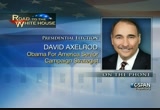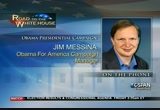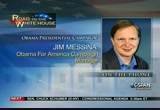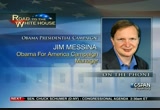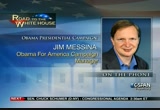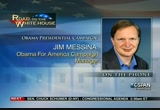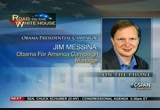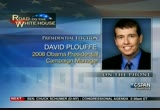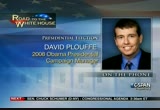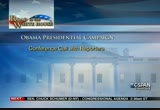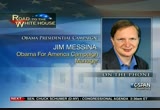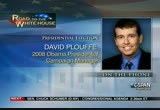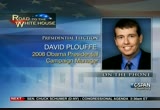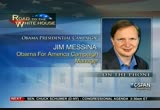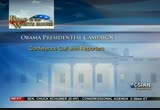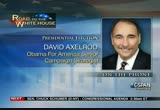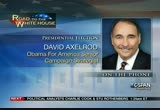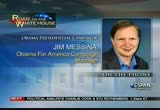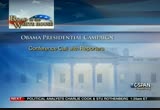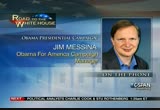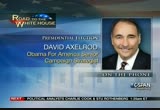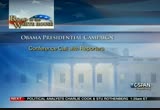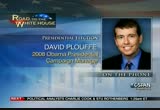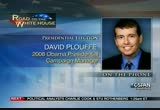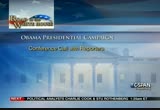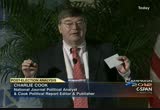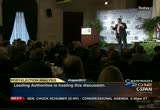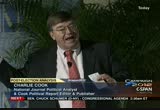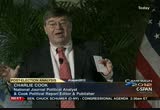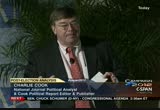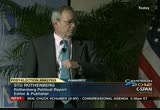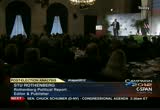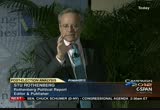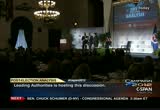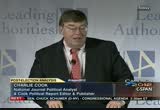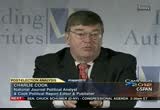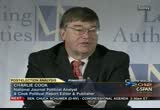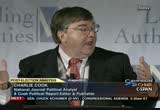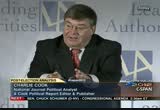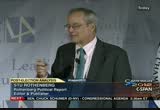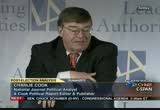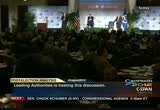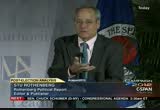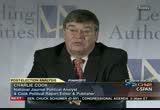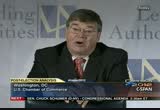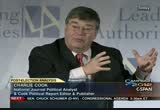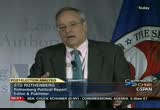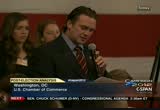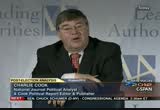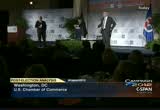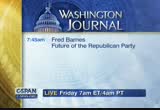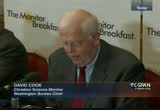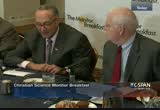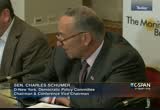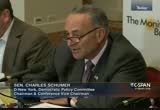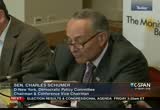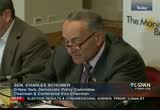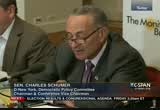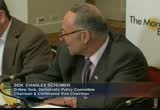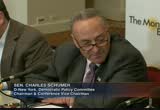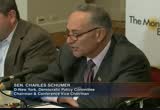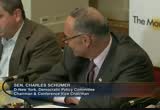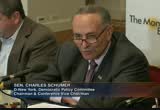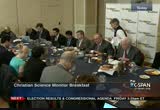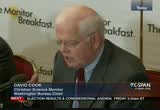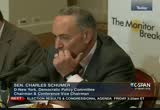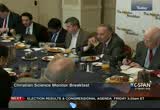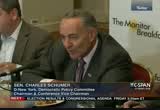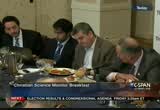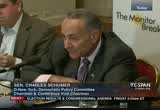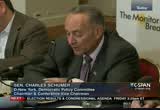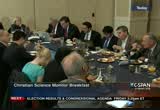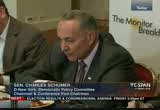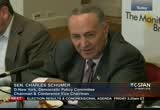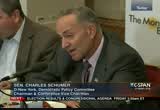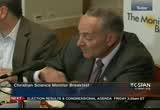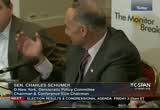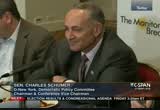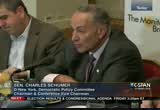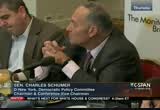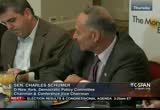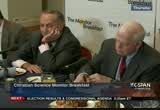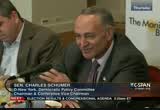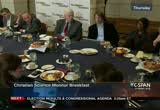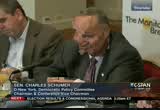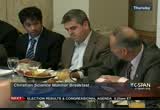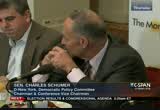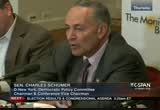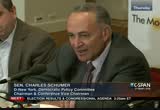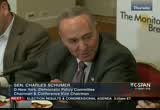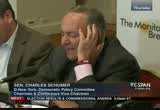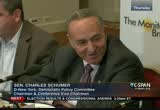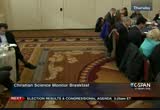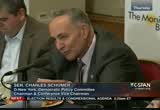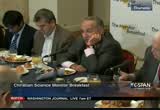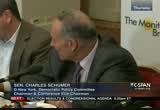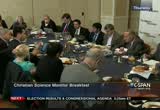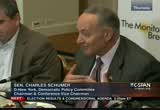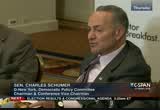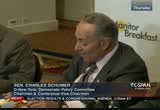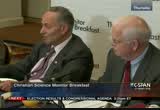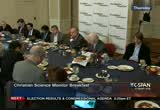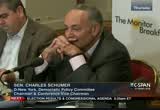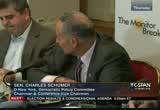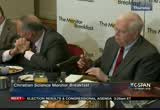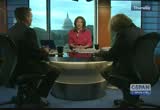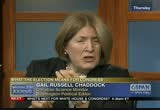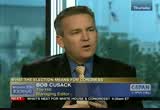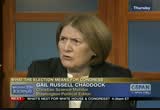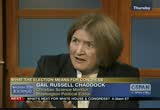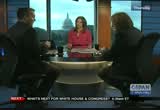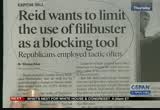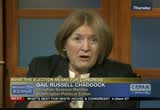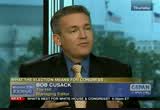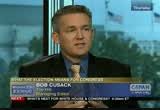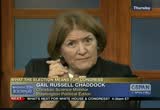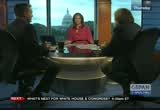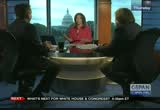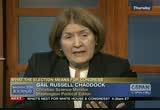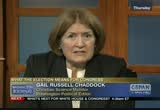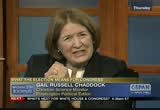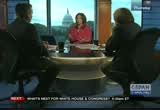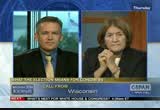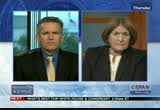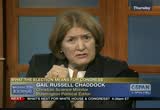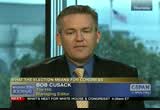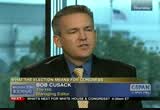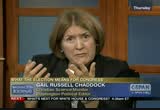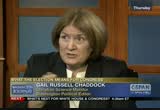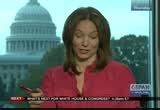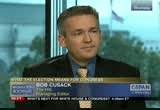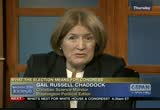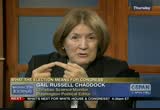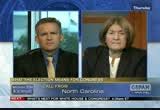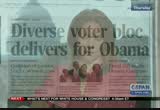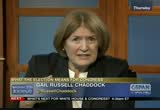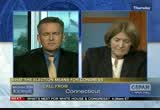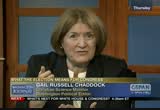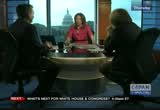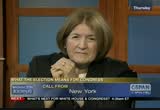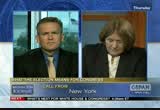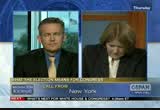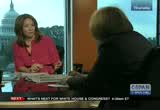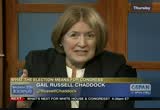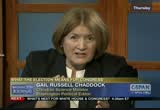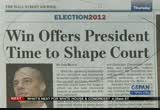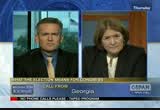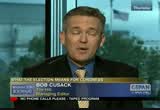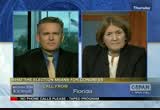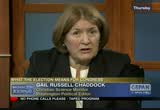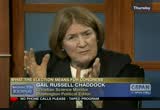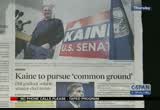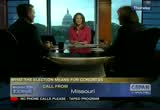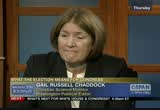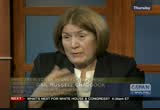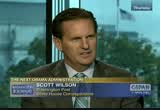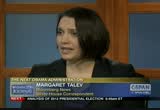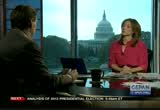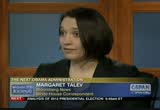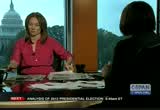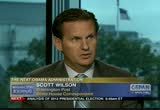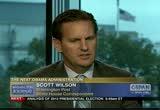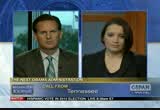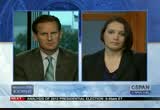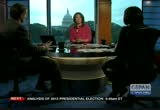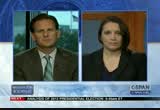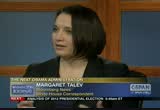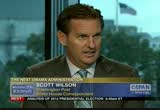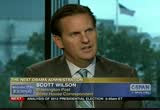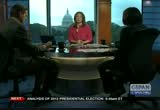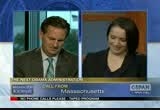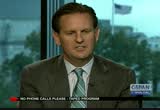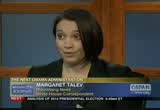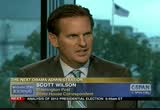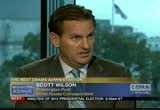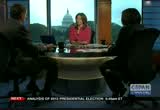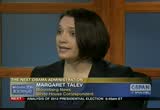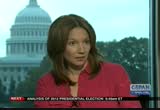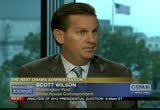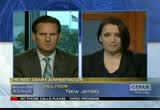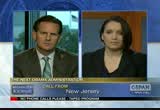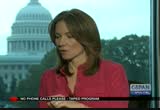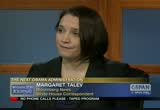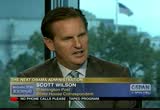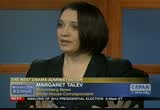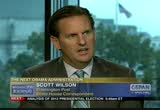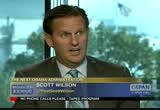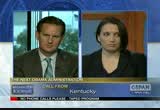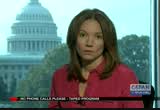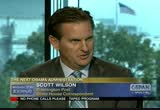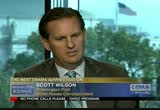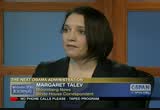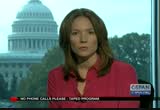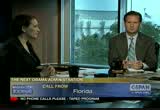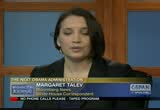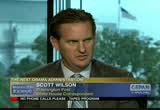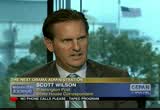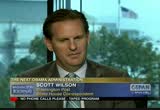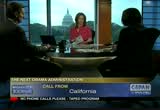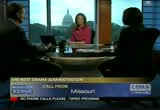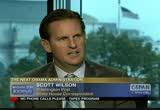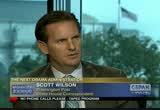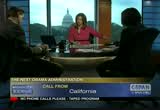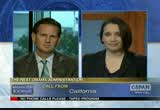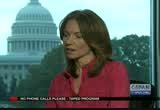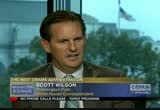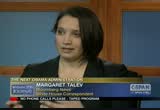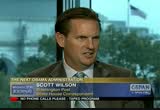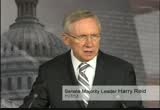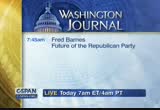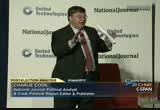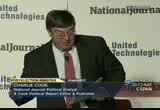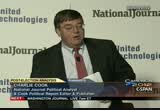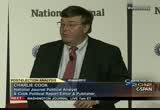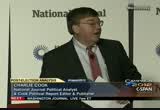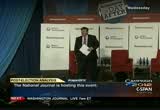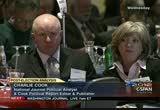tv Capitol Hill Hearings CSPAN November 9, 2012 1:00am-6:00am EST
1:00 am
guy who really masterminded so much of what we did in this election. he did such a great job as campaign manager, and he will go into more granular detail in what he saw as the results on tuesday. here is jim messina. >> hello, everyone, good to be with you. i want to start out by congratulating team romney for a hard-fought campaign. they were hard-working americans who wanted to make the country better and use the political process to do that. we wish them sleep and some time with family. i want to congratulate all the volunteers for what they did on election day.
1:01 am
we had over 109,000 people canvassing on doors, double that on the phones, and they executed a historic ground game. the reason they were motivated to do this it was not because of any analytical tools or tech product that we gave them. they were working to build this campaign because they believe in barack obama and his message and the policy he moved forward -- to move this country forward. that is what won in this election. across battleground states, we are currently sitting at 50.4. i think we will get a little better than president bush's margin in the 2004 election. our margin over republicans declined about 3.7% compared to 2008. 5.3 in non battleground states. millions of ballots are still being counted, 4 million in california alone.
1:02 am
sometime today we think we will be officially the winner in florida. as of right now, total turnout and number of voters has increased in colorado, iowa, minnesota, nevada, north carolina, and wisconsin. it looks like it decreased in 35 of 49 battleground states. the total turnout may be higher in 2008 when all the votes are finally counted. as we planned for, total minority vote share increased to 28%. our coalition turnout, women made up about the same percent of the electorate as in 2008. we got 65% of women voters.
1:03 am
for lots of reporting about youth turnout, they continue to turn out and take control of their future. in virginia, we increased our youth percentage. in florida, voting rates increased to 16%, and we got 61% in 2008 and 66% in 2012. african american turnout and support was as high or higher than ever. in ohio, african-americans increased from 11% to 15%. we got somewhere between 9% and 97% in every battleground state.
1:04 am
71% of latino vote, the highest percentage of latino vote since 1996. in florida increase from 14% in 2008 to 17% in 2012. we increased our vote share in florida from 57 to 60, which appears to be a high mark for any democratic candidate. for the first time since the revolution we won a majority of cuban voters in florida, which marks a dramatic realignment in policy for that state. in colorado, latino votes it increased from 13% to 14% and support increased from 61% to 75% in 2012. both the size of turnout and support level increased to historic highs in colorado.
1:05 am
back to the message, we won self-described moderates, we won on medicare 52 to 44. 21% of voters said the most important thing was that the candidate cares about people like me. among those voters, obama won 81-18, which is a historic number. 60% of the majority supported increase in income tax including a plurality that supports our position moving forward.
1:06 am
65% want to give illegal immigrants a chance to apply for status and 75% agreed the president's policy of moving forward favors the middle class. all those important lessons from 36 hours ago continue to make us feel good about what we have built. i will turn it over to david plouffe to talk about some of the things we saw in the states. >> david and jim mentioned a very important number, 56% of the moderate voters in the country supported the president. that is important. sometimes the independent voter question gives you a little bit of a false positive, because some of those folks are actually
1:07 am
democrats or republicans. there are certain counties that really are bellwethers. a lot of them have a lot of suburban, moderate voters. loudon county in virginia, a quintessential suburban county. hamilton county in ohio, arapahoe county in colorado. that speaks to how well the campaign volunteers did a tremendous job. the president also showed a great appeal in these moderate, suburban counties. what is clear is his position on taxes, education, some of the social issues, really spoke to a lot of these voters. turnout in and of itself is critically important, what when
1:08 am
you couple that with real appeal in these battleground states, that is one of the key reasons we won. that is important to understand going forward, those moderate voters pretty resoundingly chose the president's agenda for where they want to see the country head. >> why don't we go to some questions? >> we will pause for just a moment to compile the roster.
1:09 am
please hold for your first question. >> the president talked on tuesday night about how the responsibilities of citizenship don't in with this vote. how do you hope to translate your success into governing in the next four years? >> we will have a conversation with our supporters. the president talked about all citizens being part of the process to handle the fundamental challenges facing us. we will go for a discussion with our supporters about where we go and what we do.
1:10 am
the one thing we understand is that we want to stay involved here in the issues of the day and continue to be a part of moving forward in a bipartisan way in tackling these challenges. >> i guess this is mostly for david plouffe. how do you prioritize within the white house right now, in terms of dealing with republicans on the fiscal cliff, but also cabinet changes and any white house personnel changes? can you do them all at once, or do you need to work on the financial matter first? >> the president in the campaign it laid out his economic plan for how to build an economy, strengthen the
1:11 am
economy. that is obviously a central focus of not just the next few weeks, but the next four years. part of that is to reduce the deficit in a balanced way. obviously we have some deadlines approaching. one of the messages sent by the american people throughout the campaign, as jim misener mentioned, clearly shows the president's view of making sure that the wealthiest americans are asked to do a little bit more in the context of reducing our deficit in a balanced way. it is clear that the voters did not see compromise as a dirty word. it is essential for democracy. balance is another important component. hopefully in the aftermath of the election our leaders in both parties and around the country will do the right thing here to help move our economy forward. as the president often said
1:12 am
during the campaign, we've got a lot more work to do, but we have made progress, and we have to build on that. this is one component of how we do that, moving forward. >> always curious, did you ever think michigan was seriously in play, given the president's tally being higher in michigan and in georgia or other states? >> we always feel very confident about our chances in michigan, because the president's unprecedented actions on auto recovery, we did keep a strong ground game.
1:13 am
we saw the same things you saw. >> we saw the whole industrial midwest as a bulwark for us, in part because of what jim said, because of the president's leadership in saving the american auto industry and what that has meant in this region, but also his commitment to the revival of manufacturing more broadly, and to the security of the middle-class, which is something that is deeply felt here. we felt governor romney profile was not a good profile for this region, even though he was born and raised here. >> next question, please. >> could you assess -- this was
1:14 am
the first time anybody had to run a race with this much outside money. what ended up being the point and effect of it? >> that is a really important question. in some ways, the results were very heartening. it's all literally billions of dollars spent, not just to unseat the president, but to change the congress, to change the senate from democrat to republican, to hold and expand the republican majority in the house. as we stand here today, the president was reelected, there are more democrats in the house, and if i were one of those billionaires' funding crossroads and those other organizations, i would be
1:15 am
wanting to talk to someone in asking where my refund is, because they did not get much for their money. one of the questions we will have to examine is, what with the impact of this unprecedented deluge of media, particularly at the end of the final week, more than $100 million was spent against us in these battleground states. how much influence did that really have? i think this is something that will be worthy of study, but just looking at the results, the hard news is that you cannot buy the white house. you cannot overwhelm the congress with these super pac dollars. i would think there will be reluctance in the future when
1:16 am
mr. rove and others come knocking on the door because of what happened on tuesday. >> thanks for the call today. early in the campaign you pointed to the bennett senate race from 2010 and a potential model in colorado around appealing to latino voters and women. what do make of the exit poll data that shows a five point decline for the president's support among women this time around? >> i have not looked deeply into the colorado numbers, but among when overall, 55% of women voters, down from 2008. we felt good about what we built their, doing very well in denver and boulder.
1:17 am
that has to do more with message than a dozen or ground game. colorado by four points favored the president's state wide. we carried moderate across colorado, and that says a lot about those economic and social issues that colorado voters care very deeply about. >> we have time for two more questions. >> i wanted to ask about the hispanic vote in florida. if what you said is true about the cuban vote, and there was an exit poll today in miami that shows you all winning 83%
1:18 am
of the puerto rican vote. in the past they voted republican. can you talk about what the shift toward the democratic party mean for florida as the biggest battleground state? >> the issues that latino voters care about are like everyone else, the economy, jobs, education. they watched the republican party in the primary use them largely as a football. mitt romney said he would veto a piece of legislation like the dream act, that makes it hard to go and get votes in november. it was as clear choice as any in generations on those issues. nothing that is one of the reasons why we got historic
1:19 am
numbers with both of those communities. >> hispanic communities are aspirational communities. they are hard-working folks who want to build something for themselves and their families, and education is central to that, the ability to get access to health care is central to that. i think the president's sense of advocacy for working people everywhere, for 100% of the american people, and not just 53% of the american people, was something that resonated strongly in these communities. as i said in my initial remarks,
1:20 am
the republican party is going to have some soul-searching to do as to whether they are going to represent the united states of america as the united states of america is, and not based on some 50-year-old model. >> operator, last question, please. >> in 2008, after the election, you famously left open offices across the country to keep your round game intact. what happens to that infrastructure now, and the think the ground game in the infrastructure you have for this campaign can be translated to whoever runs in 2016? >> thank you for the question. as we talked about earlier, we
1:21 am
will go for a process with our supporters and have a conversation with them about what they want to do next. we have always listened to the ground game, listen to our supporters. part of the lesson of 2012 for us is let people run the kind of campaign they believe in. that is why the president's message resonate so well out there. we will have a process for our folks where we discuss the future. we will spend some time learning the lessons from the other night before we start thinking about 2014 or 2016. >> first of all, we are going to take our cues from our supporters, things got done because our supporters and americans across the country lifted up their voices. they will play a very important role.
1:22 am
it you are not going to be able to change washington solely from the inside. that is what the president has always believed, that we need the american people to keep pushing on washington and their leaders. you just cannot transfer this. people are not going to spend hours away from their families and their jobs contributing financially when it is are for them to do it unless they believe in the candidate. all of this, the door knocks, the contributions made, the phone calls made, or because these people believed in barack obama. for candidates who want to try and build a grass-roots campaign, it's not going to happen because there is a list are because you have the best technology.
1:23 am
they have to build up the kind of emotional appeal so people are willing to go out there and spend their time and resources and provide their talents because they believe in someone and what they are offering. we are hopeful that many people that helped us this time will end up running for office themselves, are leading nonprofit, or playing enormously valuable roles in their community. again, i think the only reason all this happened on the ground, we have remarkable staff and the campaign they put together is the best in history. the reason those people got involved is because they believed in barack obama. it was the relationship between them and our candidate. >> one last thing, we never thought of you guys as rooters. >> i think that is it.
1:24 am
thank you all for joining us. this is our last conference call for the campaign. it has been a pleasure talking with you often, and i am sure we will have an opportunity to work together again. thanks. [captions copyright national cable satellite corp. 2012] [captioning performed by national captioning institute] >> c-span allows middle school students to send a message to the president. a chance to win a grand prize of $5,000. the video cam competition is open for students in grades 6- 12. for complete details and rules, go online to studentcam.org. >> this is one hour.
1:25 am
>>i really need to find -- maybe using chris christie's personal trainer was not a good idea. [laughter] anyway, thank you for coming. we always ask for whom the bell tolls for, and it tolls for thee. thank you for having as back. for stu -- leading authorities has put our kids in school and feed them and put clothes on them. wonderful job. fabulous speakers bureau. thank you. we have had one night of sleep. i tried to experiment this morning while shaving. i tried to put everything that was really important on one 3x5
1:26 am
card to boil it down. here are some actions. hopefully all of our thoughts will evolve and look more polished. to me, you look through somewhat this year and ask, what are the important things? we had an economy that was not supposed to reelect the president. when you have 43 months of more than 8% unemployment and look at the gdp and disposal income and house networth and poverty rate, this was not an election that was intended to reelect president. that was sort of how we started off the year.
1:27 am
then we had one party that decided to require all of its candidates for the nomination to jump off an ideological cliff. that is punctuated by that february of last year fox news debate. they asked each of the candidates if you would take a deal that for every dollar in tax increases there would be $10 in spending cuts. not one hand goes up. you know mitt romney knows better. you know jon huntsman knows better. the other six -- [laughter] you know those two and the fact that two rational, reasonable, highly intelligent people concluded that to raise their hand would be to slash their throats for the nomination, that really tells you something. the third thing that was really
1:28 am
important to me was that you had a campaign that decided not to define their own candidate. you think back to the romney campaign. they won the nomination very tactically. they raised more money. they destroyed their opponents one by one. they dismantled them. but they chose, even during the nomination phase, to never tell anybody who mitt romney was. as soon as it won the nomination, i think it was one rick santorum dropped out, they decided to focus on discipline. they thought any topic that was not on obama are the economy was not worth a dollar spent. is spent entirely until just before the convention on banging on the economy and the obama. to a certain extent, we have an incumbent president running for re-election, it is a referendum
1:29 am
on the incumbent. it is a referendum on the economy. but the thing about it is, you have got to define your own candidate in a way and a positive way biographical advertising and testimonial advertising. you need to make them a real, three-dimensional, trustworthy individual. think of the boy scouts. that is a general idea. that is a general thing you want to get across. you need to apply that to your candidate in order to protect them from the slime that is coming. in the romney campaign, they adamantly chose not to do that. the obama campaign, give credit where credit is due, they saw their opponent was undefined.
1:30 am
i sat with some focus groups. other than a romney was a republican nominee for president, rich successful businessman, maybe one added to all would know he was a mormon. other than that, they knew nothing about the guy. the obama campaign comes in and takes a baseball bat and basically beat his brains out. in the swing states, he never recovered from that. even when the first it happened, even when his numbers went up and all 50 states, they go up less in the swing states than they did in the other 40 something states. that made a huge difference. then you saw that one campaign
1:31 am
chose to have a fabulous job of get out the vote. both sides tried. the romney campaign did a lot. to me, campaigns are evolutionary on the two sides. look back to 2004. matt dowd, they put together a fabulous state of our campaign in 2004. republicans really got it. howard dean revolutionized the use of the web. john kerry went forward on that aspect. but boy, the bush campaign had it going. in 2008, the mccain campaign was up and down. the organization after its, what they had in 2004 was lost in 2008. it had to be rebuilt by the romney campaign, but only after their able to get the republican nomination in april.
1:32 am
it was late in part because of super pacs, which kept the process going much longer than it ever normally goes. as long as you and i have been watching this and before that, when a candidate started losing primaries, other donors close their checkbooks. you run out of money and you drop out of the race. what is happening is, they kept
1:33 am
gingrinch going for a while. the process went longer and longer. romney had to go so much further and longer -- here is a guy who is probably by nature -- when we met for him when he ran for the senate in 1994, that is where he was. he has to run so much longer and further to the right than he ever dreamed and in part because of the super pac effort. then you had -- i guess the final thing i would say is having the economy kind of -- i do not think we are seeing a big economic turnaround, but we
1:34 am
have the stock market moving up. we had consumer confidence that is now one measurement of that eight month high. the housing sector is showing signs of life. most importantly, consumer confidence is in the right direction. it is a little better. we are seeing the percentage of people who think the economy is getting better has moved out. all those things together, we got what we got. before the election, i put together a sequence of states of what romney had to do. when you boil it down, yes, you look at 50-48. it's a close race. romney ended up winning all of the mccain states, but indiana.
1:35 am
-- plus indiana. north carolina barely in. and that was it. look at the sequence of states where after north carolina, we have florida on the edge, but it looks a little bit more likely to go obama. florida, virginia, iowa, nevada, ohio what i put him over the top. he did not get anywhere near the progression. there are a lot of things going pondweeds, but the most important thing is that republicans is that they need to do something about their brand. it is basically the center of the republican party is older, white men.
1:36 am
that is not where this country is going. when you look at african- americans, latinos, the fastest-growing group, asian. and the obama got 71% or 72% of the asian vote. the future does not look like the republican party. if i were the republican party, they will have to do some real soul-searching about immigration, social and cultural issues, because this is not a party design for the future. if this were a business, you would say they have an inherently flawed business model for the future. the republican party, they have four years they need because they are coming out for some candidates that are awfully exotic. [laughter]
1:37 am
my wife got me to stop using the term "wacko." not only do they take themselves down, but they define their party in a way that keeps people who ought to be able to win from winning. here is one last comparison. think about moderate republicans, the kind of people they need to be nominating more and more. think about the moderate republicans that ran on tuesday in blue states. think of scott brown, the former governor in hawaii, heather wilson in new mexico. they could not win because of their party's brand. heidi won. joe donnelly won. this is a one size brand contaminates all other candidates, even the ones that have no ability whatsoever in some of the exotic party.
1:38 am
yeah, we are going to hear a bunch of people with iq's lower than room temperature say that mitt romney lost because he was not conservative enough. but i think after republicans go through their seven stages of grief, they can get to a point where they can make some changes if they will be a party for the future. >> thank you, charlie. we enjoy being here. we're trying to say something
1:39 am
that is interesting and thoughtful and novel hours after the polls close. i hope i come close to what he said. i really wanted to come out here. i really wanted to come out here and say -- i just heard what charlie said. there is not one thing i agree with. he is absolutely wrong about everything. i never say that. we always agree.
1:40 am
[laughter] we are in general agreement on what happened. politics is so much about expectations. expectations changed out the cycle at various points. if i told the we were going into election day and it was a -- you would have been surprised. before the first presidential debate -- after bill clinton walked out on the stage of the democratic convention and looked out to the audience and the country and under those famous words, "even i, even i couldn't fix the economy in four years." in his humility and honesty, it was a decisive event.
1:41 am
i remember what happened with a 47% and the romney tax returns. it was at that point in the end of september and beginning of october where people thought the race would be over. after the first debate -- right before the election, we look back and say, wow. i am surprised we were in a close race. the president's negatives were up. job reports were down. how could he possibly be re- elected with unemployment numbers like this? when you evaluate where we are now, the prospective changes when you think of where we were at various points.
1:42 am
it was a strange election with ups and downs and twists and turns. it was a crazy election year were many of us pendants and political analysts were wrong. >> speak for yourself. [laughter] >> i said i wasn't including you. this is a race where herman cain led the republican race for 10 days. nobody expected the convention to be decisive. there never decisive. there are orchestrated. they are planned. it is at the country music awards. we have the first debate. people said the debates do not matter. the first debate is decisive. it redefined mitt romney. what happened is -- and charlie is right. the president's campaign was right in the defining romney early on. they defined as a rich guy who was out of touch. he did not have a plan and there are no specifics.
1:43 am
he was artificial. the problem in the campaign's, when the voters get to see the candidates, and in the debates that people feel like they are seen the real person. the way that romney appeared was not the way he had been defined. it was a race that ended close to a tie. that wouldn't be shocking. yet, if you are a republican voter -- >> right there. >> he is a former party hack.
1:44 am
if you are a republican voter or sympathizer, you do not have a pleasant taste in your mouth after the election. we-we had mixed results. republicans continued to hold the house and the senate-the democrats holding the senate. mitt romney made significant inroads among many groups. not all groups, but many groups. young voters, up white men and women, a number of constituencies and proving their showings. yet there was a feeling that it did not go well. if you are a democrat -- a lot of this is about expectations.
1:45 am
we have had three way the elections in a row. the thing we can agree upon is that this was not -- it seems this was an election where the basis held. the broad divisions that american would have liked became apparent. what does this election about? look at the congressional level and the presidential level. their word two abroad a different use of government and whether it was-their word two, a broad, and different views of government and whether it was helpful or hurtful. whether to let the free market work its magic and create jobs and opportunity. there's also the nitty gritty part of the campaign. the early ads in a swing state
1:46 am
to get out the vote. on the broad themes, the presidential race was about. -- split 50/50. it showed a slight advantage to the democrats. that has to do that demographic shift. i remember when i came to washington. i remember writing an article for it -- remember that? public opinion magazine? >> yeah. >> on the electoral lock. i think you will see people start to write about a democratic electoral lock due to the changing demographics. we are seeing an electorate where the democrats are doing well among african-americans, hispanics, asians, younger voters, and white liberals.
1:47 am
now that needle appears to have moved slightly to the democrats, so that if you have a kind of normal base election, the democrats have a very slight advantage. i think most people say we will continue to grow over time, unless the republicans do something to make inroads into some of the court demographics. if you look at the house races, you have to be cautious about the big message you are drawing. yes, the democrats gained what looks to me by my count about eight house seats. half their gains have to do with coming from illinois and california and are largely redistricting gains. but republican still control the house.
1:48 am
what would you say was the democrats' message this election cycle, in terms of the issues are policy? they talked about republican extremism but, what is the strong message that the congressional level? it was two-pronged. one, medicare, and two, the ryan budget. medicare is one of the examples, and the right and budget shows different priorities, and republican parties are wrong. that message did not really work. it was not a decisive win, certainly at the house level, for that message. my editor mentioned this to me as i was going out the door last night.
1:49 am
we had three major house special elections over the last couple of years. one in pennsylvania, mark critz won that one, one in new york when chris lee, he of sending photographs, left office in upstate new york, was replaced by democrat, and the third when the arizona seat opened up after congresswoman giffords stepped down after that horrible shooting, she was replaced by congressman barber. the democrats won all three of those special election, and indeed to every case, they said they won because of medicare. that is what it was, medicare. then what the democrats said
1:50 am
was, and we are going to use that as a template for winning the 2012 election. it didn't work at the congressional level. when you look at the exit polls and see why people voted in how they voted, times it is not so simple. the exit polls have some very strange results. is the country headed in the right direction are seriously off on the wrong track? right direction, 46, wrong track, 62. keep that number in mind, wrong track, 62. -- 52. what kind of job has barack obama done as president? approve or disapprove? the approve its 54%. did you notice that? 54%. i have not seen a 54 job
1:51 am
approval for the president in a long time. 52% of the country thinks the country is headed in the wrong track and 54 approve of the president's performance. but those numbers together. another question was significant for barack obama and it hurt mitt romney. who was to blame for the current economic problems? they gave a choice, the president or george bush? 38% said president barack obama, 53% said george bush. this goes back to bill clinton. folks, it and i could not have solved this problem. it's all george bush's fault. i think the president and his team and the democratic party got a lot of mileage out of the bush years and out of what the public concluded was george bush's failings or shortcomings. you don't have to agree that he failed are had shortcomings, i
1:52 am
am just telling you what the public thinks. that is what matters now. but i think the lesson coming out of this election -- i think charlie is right, the lesson coming out of this is that the public now is inclined to say to the democrats and republicans need to do something to change their message, to change their reputation and image. i think generally, charlie is right with what he said about the republicans being extreme and too ideological. i think that is certainly true. it is also the case that republicans have another problem. the democratic base has a particular world view and a set of assumptions and values that
1:53 am
increasingly in a polarized environment makes it difficult for them to vote for scott brown and heather wilson. the problem with the republicans -- they have some very ideologically driven voters, but part of the republican base is more open to voting for democrats than the democratic base is to vote for republicans, i believe. that even example. -- let me give you an example. heidi is a terrific candidate in north dakota. mitt romney one north dakota by 21. and i was able to overcome that. -- heidi was able to overcome that. it is true that the president won north dakota slightly less than -- mitt romney won north dakota at slightly less than the president won massachusetts. but the republican coalition includes kind of a soft swing voter that is inclined to vote
1:54 am
republican, but as more willing to vote for democrats. john barrow in georgia, the republican candidate was horrendous. a challenger refused to debate the incumbent. [laughter] i didn't say it was a bad decision, i just said it says something about the challenger. i think this is an additional problem. it is easier for moderate, centrist democrats to feel the republican voters than for moderate, centrist republicans to feel for democrats. there is a lot of stuff to talk about.
1:55 am
i think in the short term, you are seeing some immediate republican flexibility on taxes and on dealing with sequestration and the fiscal cliff. i talked to one republican media consultant the other day he said, you know, i think there's a chance that if obama wins comfortably with the electoral college and the underperform in the house or the senate, and clearly the republicans underperformed in the senate, every tossup race with democratic, just as charlie said, every swing tossup state went democratic, magnifying the outcome. if something like that happens, i think republican folks will give a little bit on taxes, because republican members of congress are just tired of being hammered for being for
1:56 am
millionaires and billionaires. it looks as though the election goes against us, i think they will give ground there. so in the short term, i think there is an opportunity to address some of these issues, including the large defense cuts and across-the-board cuts and deficit issues in short term. but still, count me as a skeptic in the long term, on the bigger question of taxes and spending and entitlements. because the way the political system has developed, the way the parties are, tuesday night we are all in this together, boehner comes out the next day, yes, we can work this out, but over time, the reality is still up to very different parties with very different values, very different constituencies, and when republicans starts to get to squishy or a democrat
1:57 am
starts to move to the middle, they get pounded on. shawn hannity, rush limbaugh, and shultz, and rachel maddow. i started seeing earlier, getting e-mails from the pccc, which is the progressive change campaign committee, which saw the success of 2010 on the right and said we could do the same thing on the left. there is just more and more movement on the extremes, demanding in the party faithful to stay faithful.
1:58 am
we still have primaries and republicans have to figure out a way to avoid todd akins and richard mourdocks. there is no increase in the christine o'donnell vote, the witch vote. the republicans had five seats in the last two cycles for the have sacrificed a seat by nominating sharon engle and christine o'donnell, and now the two this time. republicans are going to have to figure out how to do this. they are attacked as washington trying to tell folks in individual states to to nominate. they don't get involved, they don't play a role, and they just have to watch outside groups come in and give them lousy nominees.
1:59 am
so i do think the republicans will be going through some soul-searching, trying to figure out how they can appeal to african-american, asian, and hispanic voters. mia love got a prime-time speaking slot in the republican convention. an african american woman, a haitian immigrant. and she ends up losing. so the party clearly is going to be looking for other, new candidates. i will not talk about 2016, but you have to think that bobby jindal will continue to be more and more visible. marco rubio, susana martinez,
2:00 am
the party needs to change. the democrats are in a very comfortable position now, i think long-term, politically, where they have demographics on their side. as long as they don't go too as long as they don't go too far left, they will start off with a slight advantage. having said that, this is a crazy political environment. a lot of the political rules have been thrown out. more than anything else, i'd advise you to expect the unexpected. not just the next two or three months, but the next five or six years, until the country does decide one way or the other that it is going to choose between two grand visions. i will stop there and we will take questions, comments, or arguments. [applause] >> i just wanted to add one thing. which comes closer to your view, governments should do more
2:01 am
to solve problems, or government is doing too many things better left to business and individuals? governments doing too much, government doing too many things better left to business and individuals. the responses from the public, government should do more to solve problems, 43. governments doing too many things better left to business and individuals, 51. if i gave you that question, we do not think that mitt romney would have won the election? but a quarter of the people who said the government is doing too many things better left to business and individuals, a quarter of those people voted for the president. >> it is a quarter after nine. we will go until quarter of 10 with questions. the conventional wisdom is that washington is dysfunctional and
2:02 am
relationships don't count as much as they once did, but it was sort of amazing to look at the electoral map from alabama to texas and texas up to montana, and that was a solid red. look at stake like oklahoma where two-thirds of the voters voted for romney in massachusetts were two-thirds were for obama. it is hard to believe how we are going to get there in terms of compromise when the voters in both states represented by republicans and by democrats in their states are so partisan. >> yes. >> i was talking during the practice with someone about when you create these ideological echo chambers in each party, it just makes it very, very difficult. it sounds like a good chance
2:03 am
that nancy pelosi is stepping aside. we don't know if steny hoyer is going to move up or if they move down to a generational thing. could either one of them make a deal stick within their caucuses? even if mcconnell and reid both tried to put something together, they have some exotic people on their side. you are absolutely right, and then toss in one more factor. you've got all the dysfunctional capitol hill, and then you have a president that basically has no relationship whatsoever with congress on either side. virtually no interaction with
2:04 am
members of congress. wow. >> i don't agree with anything charlie just said. no, i agree with everything he just said. the key may be whether the president shows decisive leadership. i don't think decisive leadership necessarily is what he showed a lot of the time in the first term. not that he did not show any leadership. he did not get his hands really dirty. the public option fight we had, if you send it to may i will sign it. he let nancy pelosi take the lead on the public option, and on a lot of things.
2:05 am
we knew what he preferred, but he did not twist arms. he just did not seem to get involved in the details. is he going to do that now? if he does that, is he going to just -- "well, i got a second term, we pick up seats in the senate, so now the republicans have to come to me." real leadership is going to your own party and saying i am going to bring you along. he has more sway in his own party than he will telling michele bachmann what to do, or telling ted cruz what to do. he is limited to what he can do, just as john boehner and democratic leadership are limited by the broader environment. >> i am sensitive to this --
2:06 am
everyone in this room should read the fourth volume on lyndon johnson. it is available on cd's. it is 26 cd's long. that is a drive from washington d.c. to tampa, florida, where they had the republican convention, to charlotte, fort bragg, back to charlotte, washington. that is 26 cd's. [laughter] but i have this image of lyndon johnson spinning in his grave at the idea that there is the president of the united states that has minimal interaction of congress, especially some of his own party. let's just forget republicans
2:07 am
and tea party people. forget them. just in his own party, wander around the hill, as all of you do all the time, and ask democratic members of congress, how much personal interaction do you have with the president? i hate giving political credit for anything, but they have that piece back in may that pointed out that the president, as of may, had not had a single conversation this year with the their kent conrad, chairman of the senate budget committee, where tom harkin, phone or in person, this year. now, you could talk about the party obstructionist, this and that, but if you are not talking to keep people in your own party. i checked with the unofficial historian of the contemporary presidency.
2:08 am
the president played golf 104 times. the know how many members of congress have played golf with him? two. that is it. there are 40 basketball games that are known, and there were 10 members in one game. that is it. there are democratic house offices of not freshmen and sophomores that have never had a single white house official walk across the threshold. let's say the president is 100% committed to getting a budget deal through, a grand bargain. but you have to ask yourself, even if his intentions are absolutely the best, and even if he is absolutely committed to it, he is going to have to change the whole way operates, 100%.
2:09 am
a democratic lobbyist friends of mine says the model of the white house seems to be, no new friends. i am a long-term optimist and a short-term pessimists. but we will see. >> bill clinton wants any new friend he could find, and that was part of the reason he was so successful politically, and this president has a different way of operating. >> i caution you on deriding herman cain. if he could do 10 days, don sweeney could go the distance, and i will give her my check right now. obviously the republican grant
2:10 am
is not working, or is a different version of the brand being resented that is allowing republicans to basically control most of the state. what do you think the differences? >> distance from washington and distance from the national party. you can obviously look at any election and a number of different ways. republicans could take some comfort in knowing that romney lost 50-29. -- 50-49. a couple of months ago, out of 11 swing states, republicans carried one. he basically one what john mccain won, plus indiana, which nobody considers a swing state, plus north carolina. you go one out of 11, then you
2:11 am
have the senate tossup. republicans lost nine out of 10. i think senator cornyn and all the folks -- one of the more talented campaign committees i have ever seen. two cycles in a row, they have had the worst loss. when your party nominate people that are so exotic that they have little or no chance of winning general elections, that ought to be very winnable, that is not something campaign committee can do anything about. you have party bosses from washington dictating who are candidates are going to be, or do you allow yourself the diversity of a bunch of wackos?
2:12 am
>> a whole bunch of these republican governors were elected in 2010, which was against barack obama, the stimulus, the takeovers. no matter how partisan the state, they will send the opposite party to the state mansion, but they will not send them to d.c. even bob ehrlich one in maryland, and democrats get elected governor -- sullivan in wyoming, sibelius in kansas. republicans don't want to send a democrat to d.c. and democrats don't want to send a republican to d.c. in 2014, they will probably be
2:13 am
running against fatigue of the second obama administration. >> take a look at how close it was in indiana. four points. >> it should have been 12 or 15. >> a big article in the washington post today about expenditures. what do you think? >> you are asking me that here? i looked at the article. there was so much money in the political system. of billion dollars in tv ads.
2:14 am
first of all, there's the question of the quality of the ads, but then the question is just the sheer weight of the ads. there were so many ads and so many states, what moved the election? the debates, it was a news event. maybe the hurricane. was not the ads. that is my view. >> las vegas was passed the point where they had had their 73,000 th tv ad. some of the obama field offices never close sector 2008.
2:15 am
the saturation level of advertising, in swing states you had two kinds of people. the people that literally hit the mute button every time a political ad came on, and the people who mentally hit the mute button every time a political ad came on. >> romney was pretty far from an ideal candidate, and it sounds like the president's approval ratings were on the upswing. congress's ratings if not at a historical low, are pretty darn low. there was not a lot of turnover in the house. is there reason we did not see more turnover in the house? >> rather than have voters pick
2:16 am
their elected officials, you have elected officials picking the voters. the redistricting process has successfully insulated so many members of congress where the only re-election concerns that have are winning their own primaries next time. when the primary concern you had if you are a democrat is looking over your left shoulder, worrying about a primary next time, or if you are republican, your biggest reelection challenge is looking over your right shoulder anticipating a possible conservative challenger in the next primary. for most of these people, it is hard to imagine what that might have to do to lose re-election. it would involve barnyards and animals. >> more exotic.
2:17 am
>> i no longer look at congressional approval. i think it has no relevance to elections. i don't know why that ask the question anymore. >> many lost on the basis of redistricting. >> not going back to your district makes a difference. >> part b, the only way you get 12% congressional job approval or 10% its if republicans and democrats give low ratings to the institution. but that does not mean republicans are going to vote against republican candidates. republicans blame the democrats and democrats blame republicans. the numbers shows a lack of
2:18 am
confidence in the government and the institutions, the dissatisfaction with congress. >> we have a question right over here. >> you both mentioned demographics. the republicans today are the party of grumpy old white men. what is the path forward, particularly related to the hispanic vote? >> i think of myself as sympathetic with the business community. i think the business community as not taken a leadership role on the immigration issue, and finding realistic, reasonable compromises and selling it within the republican party, and getting some of the more exotic opinion leaders and top radio people to shut the hell up. when you are in a whole, stop
2:19 am
digging. the republican party needs to, number one, addressed the immigration issue and stop alienating latino voters. goingt think we are ever to see any appreciable number of order ricans ever voting republican, but with mexican americans, as mexican-american incomes rise, their willingness to consider voting republican goes up. yes, when you have leading voices in the party -- if you were going to say what were the two worst decisions mitt romney made, one was the auto bailout, the second was immigration. compounding what he said during a primary last summer, when he spurned marco rubio's dream act compromise.
2:20 am
that is number one. no. 2, just shut up on social- cultural issues. they need to deliver the message in private, quietly, and get the heck away from that. how many times in the course of a year do all of you hear someone say, well, i consider myself as an economic conservative, but -- and you fill in the rest of the sentence. there is a boatload of voters that the republican party is basically pushing away. that mentality lead you to people making the todd akin and richar mourdock kind of statements. it encourages the kind of talk that in normal society is absolutely unacceptable, and you cannot have that.
2:21 am
>> i think it is a little harder than what charlie is suggesting. should your state recognize same-sex marriage? yes, 49%, no, 46%. think of what the response to that would have been 20 or 30 years ago. the problem with republicans is, a huge chunk of the party is culturally conservative, religious voters. turnout is really important. getting the base energized, enthusiastic. i think the republicans are caught between a rock and a hard place. they need to somehow be seen as more tolerant on these issues, but i don't know how much
2:22 am
wiggle room that have. on hispanics, i would have liked to have seen if it would have made any difference if marco rubio had been on the ticket. >> that's like saying i want to suck up to the irish vote, i will get an englishman. [laughter] >> it would have at least conveyed the sense of a broader republican party. that did not convey a sense of diversity. republicans are knee-jerk inherently opposed to diversity. they have a knee-jerk reaction to that.
2:23 am
i think the party needs a different look. these different spokesman out there. cubans, mexican americans, of course, but they need to present a different look. >> among the political phenomena that intrigues me the most is ticket splitting. i wanted to get your thoughts on that. just looking at some of the results, montana elected a democratic governor, democratic senator, and the president only
2:24 am
got 42%. in missouri, nixon and mccaskill, but democrats, got 55% and obama tops out at 44%, and lost every county except jefferson st. louis and st. louis city. west virginia, they elected a democratic governor and senator with 61%, and yet the president talked out at 36%. i just wanted to get your comments on that. >> you've got three different things than two different situations. in missouri, let's face it, todd akin contaminated it. in places like montana and west virginia, you have democrats that could have told you on january 1 -- could have told
2:25 am
you four years ago that president obama was going to be a liability in my state, and i am not going to have to -- there never will be any lack of distance between me and him at any point. it is not like they have been cozying up to him and then -- the picture that republicans had of joe manchin and president obama together, there is only one reason they could get the picture, because they had to be at the same funeral. that is the only reason that picture even existed, because there is not a second picture of them together. so these guys had a lot of notice to create a lot of distance, and rebel to do it. >> i have other examples i could give you. in massachusetts, a pro gay
2:26 am
marriage, pro-choice, fiscally conservative moderate republican lost, i expect, because of party-line voting. scott brown could not run far enough ahead. when john tyrannies wife's -- relatives, a's significant number of them are either under investigation, or indictment, maybe even more, it is stunning. in the chris murphy district in the northwestern part of the state, a pro gay marriage, pro- choice, moderate republican said of want to be the test of whether there is room for and they role for the old style, moderate republican from the
2:27 am
northeast. he lost 52-48 in a competitive district. there was some ticket splitting in those, but not enough. i think there were more of those districts. >> the trend is the opposite way. you can always find examples that are counter to the trend, but the general trend is that we are voting in a more parliamentary way in this country than we used to. >> unfortunately, our time is up. i would like to thank charlie and stu very much. [applause] i would also like to thank the chamber for great partnership, and to our sponsors today. if you could, please fill out that survey. on december 14, leading
2:28 am
authorities will host our final conversations at the newseum, and the topic will be the fiscal cliff. thanks very much, have a great day. [captioning performed by national captioning institute] [captions copyright national cable satellite corp. 2012] x in a few moments, senator chuck schumer on the upcoming lame-duck session of congress. in an hour, more on how the election results will affect the congressional agenda and the relationship between congress and the white house. >> on "washington journal," fred barnes the executive editor of
2:29 am
the weekly standard would take your questions about the election and the future of the republican party. we will discuss the hispanic vote with a guest from the national association of latino elected and appointed officials. and the washington bureau chief of the "los angeles times" will look at the election and demographic changes in the electorate. live on c-span every day at 7:00 a.m. eastern. >> i want it to be intensely journalistic, intensely inch -- journalistic. unless you get out and look at what is going on these days, you were going to miss the things influencing yourself and everyone else. >> best-selling author and journalist tom wolfe is live sunday from the opening night at miami book their international. he will discuss his latest novel
2:30 am
and his take on the city of miami. sunday at 6:00 p.m. on book tv on c-span 2. >> new york senator chuck schumer says washington has a responsibility to avert the fiscal cliff during the upcoming lame duck session of congress. he was at an event hosted by the "christian science monitor" to talk about the election, congress, and the party's agenda. >> thank you for coming. our guest tonight is charles schumer. his last visit with the group was way too long ago in 2006, when he had just led the democratic senatoral campaign into the first of two successful efforts to boost the democratic population. he graduated first in his class at his high school, which is, as readers of the almanac and american politics know, the alma mater of the social
2:31 am
justice group. our guest graduated from harvard college and harvard law. at age 23, he won a seat at the new york assembly. he was the youngest person since teddy roosevelt. he was elected to the house. in 1998, he was elected to the senate we he has twice-won reelection by comfortable margins. on to the thrilling matters of the process. we are on the record. please, no live blogging or tweeting. there is no embargo when the session ends, except that c- span has agreed not to air the video of the preface or post the video until noon today to give those of you who paid for the breakfast the time to file. please do the traditional thing and send me a non-threatening signal. our guests will have the opportunity to make opening comments. >> thank you.
2:32 am
>> thank you, dave. thanks for the introduction. i just learned we have four nobel laureates. at one point, we had three u.s. senators, each of a different party. that is probably a historic first. that is myself, bernie sanders, and the republican party. when i went to minnesota to work for amy in the fall of 2006, i said, there were three madison high school graduates in the senate. i hoped to make it two more. that is what happened. i think the voters sent us a message to work together and solve bipartisan issues. they sent a signal as to what
2:33 am
bipartisan compromise should look like in terms of our fiscal cliff. first, the signal to work together. you have an election where the house basically stayed the same as it was, and you had the president win a decisive, overwhelming victory. in the senate, we picked up seats. that is obviously saying, work together, meet half way, come together. neither side totally ran the table and got every part. second, on the fiscal cliff, it also sent us a message that you can discern, without too much difficulty. they said, when they sent -- what does the house republican party stand for above all? cut government spending.
2:34 am
reduce government spending. the house was reelected. on the democratic side, they sent a message that part of the fiscal compromise should be revenues. the president campaigned up to the last day. one of his major planks of his platform was revenues, raise taxes, or do not let taxes go down on the wealthy. most of our senate candidates campaigned on that as well. in the debate, mitt romney actually shied away from the republican position of not to do it, as you saw, particularly in the second and third debates. it is clear they said, go to a compromise, get a handle on spending, but raise some revenues, particularly on the wealthiest people. many republicans were hoping, they said, this election will
2:35 am
be a referendum on revenues. i hope our republican colleagues take that to heed. in 2010, there was a clear message -- cut spending. we took that message to heart. we cut $900 billion out of spending, mainly domestic confectionery spending. -- discretionary spending. that was the electoral message. we hope our colleagues take that to heart. if there is not too much dispute about the tax side, the president campaigned on it, 60% of those on the exit polls said they were for raising taxes or tax rates on the top earners to fix the deficit. i was heartened on the tones
2:36 am
speaker boehner said in his remarks. he said the president won the election. he said he should lead. he said, he was open to revenues. i thought the tone was the right thing. you cannot expect a speaker to turn on a dime in 24 hours and embrace everything. higher taxes on the wealthy, but i think privately, he has seen the handwriting on the wall. it makes me very hopeful that we can do something big in the next months ahead. it is a good first step. i would say two first things. when you unpack the speaker's speech, there is a premise that
2:37 am
does not quite work. we will have to help him move others in the republican party away from it. part of his speech, he talked about dynamic score. it is about time we debunk that myth. it is a fairytale. rumpelstiltskin was the fairy tale figure who turned straw into gold. it was a lovely thing, but a fairy tale. when you look at the studies that are put out by almost all economists, it has not happened, it does not work, and even if you still believe it works, the bottom line is the jcp will not score it. i do not want the grand agreement to fail on this basis
2:38 am
of dynamic scoring, which does not score and does not work, as i said. it is the rumpelstiltskin tax fairy tale that if you cut taxes, it will increase revenues. it is like saying, raise spending on medicare and that will increase revenues. it just does not work. it is time to debunk it once and for all. it stands in the way. the second point is that the speaker is going to need some help in bringing his colleagues along to a good position on revenues. i am very hopeful that help will come from the business community. in the past, the business community, which is a republican, basically has sort of stayed away from the fiscal
2:39 am
debates. but now, there is real evidence they want to be heavily involved. my colleague has done a lot of work in trying to get them involved. i talked to five or six business leaders over the past few weeks. almost to a person, they say, we are fine with our rates staying at 35%. we are willing to see them going up to 39%. provided that it is part of a real deficit reduction package that avoids the fiscal cliff. i hope they step up to the plate and be the counter- veiling force. when the republicans hint they will do this, all they hear from is grover norquist and those opposed to it. i believe the white house will reach out to the business
2:40 am
community and utilize and work with them on this common goal. like we have never seen before. two other quick points. i think the tea party has peaked and is on the descent. if you look at the elections, that is pretty clear. first, some major tea party figures lost. joe walsh in new york, two congress members who ran on the tea party platform lost. alan west, it looks like he is losing. todd akin and richard murdock lost. they are a little bit -- they have been through the electoral process. in 2010, they came on a wave.
2:41 am
many of them were surprised they won. in 2012, they had a fight for election in a much more divided electorate. i think they have learned. i think we will see a lot of the tea party saying, "let's repeal obamacare," will play much less prominence in these two years. that is a good thing. they were for obstruction. finally, karl rove's reputation will take a significant hit. i saw him on tv the night of the election at 2:00 in the morning. his excuse was in every swing state, we have decreased obama's margin. i am sure he said, put up these millions of dollars and we can
2:42 am
still win, but we will decrease his margins. not much of a relief. let's hope -- i do not think crossroads will be as much of a player two years from now. i think his reputation took a hit. i am ready for questions. >> let me pick up on what you were saying about the impact. does it cause you to reassess the possible damage or the impact of citizens united? >> i was thinking, what is my greatest surprise in the election? what i say here is i am hopeful it has paved the way for some reform. i think republicans saw it as a
2:43 am
mixed blessing. sometimes, the super pacs are not doing what people want them to do, such as backing richard murdock. maybe we can get some reform. having said that, the influence of money is still pernicious, bad, and i would hope that reform of financial contributions would be something high up on the agenda in 2013. i would hope we can get bipartisan support for at least the disclosure part of it. >> revenue to avoid a fiscal cliff. you talked about boehner. "we need revenues, but to agree
2:44 am
on the high-end people." does it matter where it comes from? >> yes. the most failing fact of our political economy in the last decade is that middle-class incomes have declined. that accounts for a lot of what happens in 2008, 2010, and 2012. it is a debate at the core. to say that revenues should come from the middle class, that we should increase revenues on the middle class, is something i think would be wrong. i think we should find revenues from people who make above $250,000. i think that is the right way to go. it does matter. one of the problems with so- called tax reform, at least 1986-style tax reform, and i talked about this in a speech i gave, is that if you are going to reduce rates significantly, even to simpson-bowl levels,
2:45 am
and you want to get $4 trillion overall in deficit reduction, over 10 years, you cannot do it without raising middle-class taxes. we do not want to do that. it matters very much where they come from. that will be one of the issues that come up in terms of the fiscal cliff. boehner's tone was good. when you look inside and say, we can rely on dynamic scoring, when you begin to dissect that, it has some problems. i am hopeful that with the business community's help, and with the president's leadership, we can bring the republicans around. >> we talked about [indiscernible] 3 numbers [indiscernible] do you have a strategy for
2:46 am
trying to pass the middle class tax [indiscernible] are you trying to do that [indiscernible] the tax issue, and are you going to [indiscernible] >> the general thrust of your question. i think most of our colleagues say the senate needs to be fixed, that there is something wrong with it. there will be a lot of discussions about that over the next few weeks. i will not comment on specifics until we have those discussions. it needs to be done not just for one particular issue, but in general, to get the senate working better. >> [indiscernible] >> any agreement, because we have to pass things in the house and senate, has to be bipartisan. it will not be a hurdle.
2:47 am
by definition, it will be bipartisan. [applause] [laughter] >> sorry about the noise. >> that is okay. this is just fine. i would say you need a bipartisan solution. it will have to be truly bipartisan for the obvious reason that it has to pass the senate, a majority democrat, and it has to pass the house, a majority republican. >> republicans still say boehner [indiscernible] >> speak up a little? >> republicans will still demand dollar for dollar cuts. what is a strategy for dealing?
2:48 am
>> that will not work. it will not produce a compromise. it is a no-revenue strategy. a no-cut strategy would not produce a compromise, either. >> the cost of living is high. the $250,000 part income per family is not a lot of money. do you think the president is flexible on that number? $500,000 or $1 million? >> everyone knows my position has been, that i prefer the $1 million mark. the main point is not whether it is $1 million or $250,000. whether that is going to be on the table in terms of where you draw the line in the negotiation, i just cannot tell. >> can you get the revenues you need?
2:49 am
do you have to raise the income tax on the wealthy to get the revenues you need? >> if you reduce the rates, you cannot get the revenues you need to get significant deficit reduction without hurting the middle class, as i said. that is the real problem. beginning deficit reduction by saying the first thing we will do on the tax side is lower the rates it is like saying the first thing we will do on the entitlement side is reduce the age at which you are entitled to medicare. it is intuitively counterproductive. it is counterproductive. if you kept them at 35%, it is still much harder to do. but, obviously, there will be compromises.
2:50 am
view,esident's view, my and the overwhelming view we ran on and succeeded on, is let the rate go to 39.6% for the highest-end people. >> one of the earliest questions was, despite your optimism about speaker boehner, when he is talking about revenues and the democrats are talking about changing the rates, they are talking about two different things. that is only for the speaker. [indiscernible] that is only part of the question. in addition to that, it is pretty clear they are talking about basically figuring out a way for next year and wrapping it in as part of the tax reform. if that is the house attitude, how you deal with it now? with the idea of doing nothing
2:51 am
and letting the bush tax cuts expire. and then have a tax cut bill. does that make any sense? >> to me, and i have said this before, the best thing to do is come up with a so-called grand bargain in the lame-duck session. that is when the pressure is the greatest. that is when people have the dual knives, taxes and sequestration. to me, trying to get this done as soon as possible, as broadly as possible, as deeply as possible, makes the most sense. i would be adverse to any strategy. i think it is preferable to get it done now than to say we will
2:52 am
get it done over the next year. the tone of speaker boehner's comments indicates the door is open. i do not expect total change in one day. >> brian. >> hi. two questions. what do you see the senator doing in her second term? do you see her as a possible chair? or someone else? number two, what is the situation in new york? a lot of people lost their flood insurance. the program is under water, so to speak, in the red.
2:53 am
do you see people in new york losing out on getting money to rebuild their homes? do you see the program being overhauled as a result of what happened? >> i do not think -- it is the day after the election. i do not know what will happen. you have to ask people, including the senator, whether she would want it. i have not talked to her about it. we talked about elections and congratulations. she did a great job in the senate in the first six years. i am glad to have her as a partner. in terms of flood insurance, obviously, we have huge damage in new york. it is incredible. i flew by helicopter, the first day, with the mayor.
2:54 am
the next day with the governor. you saw how broad the damage was. it was not just one or two communities, but spread out all over a huge metropolitan area. for five days after that, i spent time on the ground and you saw how deep it was. grown men crying in my arms. everything wiped out. the home, the car, everything. if you do not know what to do or what is going to happen. we do not know yet what percentage of the people -- much of the flooded areas are in a flood zone, where flood insurance is required. many of the people who require that flood insurance still did not have it. how we are going to deal with that issue is one of the issues we have to face. will the flood insurance be adequate for the people who are
2:55 am
there? those who pay flood insurance have a legal, binding commitments from the government to pay it. that is going to happen. we have to come up with the dollars for that. we do not know the numbers yet. some people estimate that over 100,000 homes are unlivable. that is probably 300,000 people, the size of a major american city. we just do not know yet. huge numbers of houses are waterlogged. it takes a house-by-house inspection to determine and we do not know yet. how it has to be changed, there has been a lot of discussion about that. it is one of the things we will have to look at in the aftermath. >> the makeup of the senate changed significantly with this election.
2:56 am
i am not talking about democrat or republican, but the election of women, the most in history. can you talk about what that means for society and the senate and what that might mean in the future? >> is great for political and substantive reasons. i preferred women candidates. in the four years when i was head of the dfcc, we increased the number of democrats on the women's side by 4. the 2 who won in 2006 won again, each by double digits. claire won by 16, some very high number, a much higher than you would ever imagine. was it 16? she told me and i forgot. 15 or 16. so we have made good progress.
2:57 am
as a political man, i believe that people compromise and come together. women are very good at doing that. i would like to see more. we are still a total number of 19, i think. 20. women are 52% of the population. we have a long way to go pri is good for the country, breaking glass ceilings, and it is good for the senate in terms of having diversity and people who are really outstanding senators. i agree with senator gillibrand. more women in the senate would probably make the place and easier place to compromise. >> i spoke with the democratic congressman and expressed admiration for for simpson-
2:58 am
bowles. i am wondering if you would share those sentiments or have another grand bargain framework that you think would be better? how far are you willing to go on entitlements in any grand bargain? >> first, i think simpson-bowles did the country a real service in three basic ways. one, coming up with a balanced package that has revenues. around the edges, you can dispute whether it was a little too loose in revenues or whether the $9 billion in cuts we have done already changed the balance. the basic approach was the right way to go. second, i thought the $4 trillion number was the right number tissue for. they chose it because it turns the fiscal cliff around.
2:59 am
in other words, deficits go down rather than up once you do $4 trillion of deficit reduction. most importantly, they put democrats and republicans together. it is necessary for the reasons i mentioned in my opening remarks. i think they did those things. as you know, i disagree with simpson-bowles. the mathematics does not work unless you are going to hurt the middle class. that is an area where i disagree and the president disagrees. the electorate agreed with us. we believe we have a mandate on that issue. overall, the basic structure is the right way to go. second question was -- look, it
3:00 am
5:00 am
5:01 am
tax cuts have not proven to be a very effective stimulus in the past. is that the extent of this? he had a new jobs bill coming out last year that did not get very far. does he revive that? $400 billion in tax cuts and new spending. is that possible? spending cuts mean something to people, as do tax cuts. it is unclear how he will approach the recovery. i know that is a perception to the twitter writer's points. the numbers show there has been some. when obama took office, the congress was losing 800,000 jobs.
5:02 am
host: does he have to work with congress on this? guest: he did some of that during the campaign year. but he has to work with congress. postcode the huffington post has a list of things that president obama -- host: the huffington post as a list of things that president obama promised on the campaign trail. so, beyond those sentences, do we know how you get those things done? guest: specific things like corporate tax rates and
5:03 am
investment in advanced manufacturing, i think those are fairly tubal within the existing budget. when you talk about how many jobs are going to be created, how do you do that? that is a political promise. mitt romney had planned for how many jobs he was going to create. president obama can be measured against that later. when it is targeted niche things that can be negotiated, that is something he can get done. broader goals are really about rhetoric and how people perceive them. it is not easy to measure. host: you touched on this at the beginning. i will ask both of you to talk about staff changes in the obama administration. guest: some of the big cabinet members. secretary clinton has said she
5:04 am
is going to go. secretary leon panetta is likely to go at some point although he may stay through the sequestration talks which would mean $55 billion to the pentagon. those are big cabinet members and they are likely to go which will take over some dominoes inside the administration as people move up to fill those. inside the west wing, he may have a new chief of staff. that would be his fourth that he has named. these are times when he can look at those working for him. only two cabinet members left in the first four years. he can begin to tailor his staff to what he wants to pursue.
5:05 am
host: eric holder the attorney general has said he will stay on. guest: that is right. he has had a mixed record. he has had a mixed relationship with the white house. he would not be the easiest guy to ask to leave. if he wants to stay, i imagine he would probably stay. host: "the wall street journal" says this -- margaret talev, who replaces let's start with hillary clinton? guest: it is a great question. i think the conventional wisdom is right in that there are two candidates that are being looked
5:06 am
at. john kerry, a sit-in for mitt romney in president obama's debate prep. the present perform strongly in the last two. they have different cases to make for each of them. for john kerry, the problem is if they take him out of the senate, they have lost this big guy in the senate and they open up massachusetts again. one perceived problem is the whole libya, benghazi controversy that popped up to us before the election in terms of whether susan rice would toe the line. to the extent that that would resonate or persist is unclear. host: one newspaper this morning said possibly former senator luger for secretary of state.
5:07 am
guest: when everybody decides there is one or two candidate, there is always somebody who could come out of nowhere. in the weeks between now and the end of the year when a lot of the decisions are going to be made, there is a floating up of names to see what happens. president obama will certainly be looking for republicans to put in high-profile positions to bolster the possibility of negotiations between the senate and house and to show americans that he was serious about reaching across the aisle. host: if the replacement of treasury -- what message does that send? guest: it obviously recalls the simpson-bowles commission and their proposal to achieve a grand bargain.
5:08 am
the president did not embrace that entirely. with a grand bargain, often it is all nothing. he was a little frustrated it was presented that way at the time. i think it sends the message that this is a centrist democrat who worked on this commission with republicans and came up with an idea. he is someone who can do that. a lot of these names -- it is unclear how engage the president has been in this. he may get these names and say i don't want them. i think we are going to see a clearer a list in the weeks ahead. host: a republican from new jersey. caller: i have a few comments. i would like to point two questions to margaret.
5:09 am
the way to sum up the second term for the new obama administration would be the first day of his presidency in his second term, the east coast was faced with nine government fema offices that were closed due to weather conditions. these people have gone 10 days without heat, hot water. the first day of the obama administration, the businesses were closed at. benghazi is not a side issue. it is a very big issue. we all have to share and sacrifice right now. 48% of the people are on food stamps and welfare. i think everybody knows to be on the government dole, you just have to sit back and vote for a democrat. i think to ask for shared sacrifice is a little bit too late. guest: i think he is articulating what a lot of
5:10 am
people who have been critics of the obama administration feel which is a problem president obama has to contend with. i think part of why he will look to republicans who he feels he can work with to bring them into the administration is precisely to help them understand these concerns. host: are the concerns spending concerns? she was talking about people who get government assistance. guest: deductions and loopholes are not going to affect you if you are not filing your tax returns. that is part of the mix and part of the debate leading up to the election and something he has to take into account because it reflects why these issues have been very difficult to negotiate. host: a viewer on twitter -- guest: yes, i do. there were some spending cuts
5:11 am
on the table certain during the debt ceiling crisis as well. so, i do. the devil is in the details. what is going to be cut? he has proposed secured spending cuts at the pentagon. republicans did not like that. so, yes, i think he understands spending has to go down but that is not answering the question. host: i want to go back to benghazi. what will we hear from the ministration on that question what happened during those attacks? guest: now that the election is over, we will be hearing more from the independent
5:12 am
investigation on this. but most likely the discussion of this is going to be initiated by republicans. this is not something the obama administration is eager to bring up again. what they are looking toward is syria and iran, and that is what they want to be able to concentrate on. if it is ambassador rice who is nominated to the secretary of state, this is an issue that will come up again in the purposes of debate over a nomination and may come up with another nominee as well. senator john kerry has defended ambassador rice and therefore may be asked to explain that if he were nominated. to the extent -- i do think primarily between now and the end of the year, the debate
5:13 am
will be focused on domestic, economic, and fiscal issues. host: let's go to foreign policy because "the washington times" as this headline -- scott wilson, do you expect that he does that? troops on the ground? guest: i do not expect troops on the grand. as far as the president would go in syria, the next step is some kind of a no-fly zone. you will start seeing the model that he put in place and advocated for in libya. he is someone who moves incrementally. the next real step is the first plunge into military would be directly harming the rebels. they do not know the rebels that well. they do not want to start sending heavy weapons to groups
5:14 am
that are clearly influenced by islamists. so that has been one caution. then the next step would likely be considering some sort of international no-fly zone like what took place in libya. host: iran's nuclear program? do we know what he might do? guest: i think in terms of old assertions of next steps, some of that may wait for the next secretary of state. this is something that the next secretary of state would be shepherding through and then stick it in somebody else's lap. it is probably strategically not what the administration wants to do unless your hand is really forced on the issue.
5:15 am
in both of these instances, particularly next steps in syria, libya does serve as a major warning and a major concern. do you know what you're leaving behind? be really have an ability, once your surgical operation is done, to have any control over what is going on there? on both fronts, i agree with scott that sort of caution, the pacing of this -- also the building of international coalitions. russia will be a big player. and on iran, what are our international allies, partners, the guys we do business with at the u.n. -- where is everyone else prepared to be before we go forward? host: on russia, this is the "wall street journal." the defeat was a relief in russia because mitt romney had called moscow the number one political foe of the u.s. it was added that mr. vladimir putin sent a telegram to mr. obama that the kremlin said was secret until the u.s. revealed the contents.
5:16 am
dmitry medvedev posted a "congratulations" on twitter. so that was from russia. another foreign policy issue is china. here is the "new york times." warm words from china with a subtext of warning. robust relationships with china while maintaining traditional military ties with the u.s. we do not want to be forced to choose between beijing and washington but what is going on here? guest: it has to be looked at in the context of the campaign that just ended. china emerged as a symbol -- weaknessy, obama's overseas, his inability to stand up to this rising asian power. the united states and china are so intertwined economically that is a very hard to start any kind of a fight between the two over trade. but the united states certainly
5:17 am
is playing a more aggressive role in asia. the president leaves in a few days, as he does every november, for a series of summits in asia, regional gatherings. the bush administration did not bother with these things. these are important for him. more military resources are being put into play in the pacific. whether or not there has to be a choice, it does not seem quite the right question. these are the two major economies that are going to be dominating the world for quite some time. they depend on each other. but there will be particular showdowns over china's contested rights in some of the islands and seas around them, and united states is already showing more willingness to take them on -- take them out on some of these issues. host: on the middle east, you mentioned legacy is a big motivator for president obama. guest: this will be sort of like immigration reform, another major goal he is looking ahead
5:18 am
to after the fiscal cliff. but the difference will continue to be that the u.s. president cannot decide what the middle east peace deal is going to be. that is a matter between israel and the palestinians, and the u.s. can nudge and between and all of that. but in the end, if netanyahu and the palestinians are not in the position to bring resolution to this, then at it is not really going to be something that president obama can do. certainly something he would like very much to do. netanyahu -- i mean, now that the election is over, i think we will see prime minister netanyahu have a recalculation of the relationship with obama and how it has to go forward. it has not been close in the previous four years.
5:19 am
it has been pragmatic and grudgingly accepting a reality on both sides, but there is an opportunity for that to change. host: do you have thoughts on that, scott? guest: just a follow-up. netanyahu had a personal relationship with romney and was a very secret about who he wanted to win the election and that was not president obama, who applied quite a bit of pressure to israel in his first term to try to secure a peace deal called israel settlements in the west bank. israel felt sort of hard-done by a lot of this bit of the agreed a lot on iran, so it was kind of a two-phase relationship. back on the palestinian question. pretty good on the wrong question. very good on the israeli military strength question. but netanyahu is now getting pressure in his own domestic politics. israel does not like when their prime minister does not belong with the u.s. president. that is not good for the israeli prime minister. netanyahu did a very good job of
5:20 am
managing a difficult relationship in the first obama term. his feeling -- he is feeling some pressure now. that may give obama a little more space on iran, and it may push netanyahu a bit towards a little more work with the palestinians on trying to get some talks going. host: butler, kentucky, democratic caller. caller: what i was going to talk to you about is most of the people on the stage today -- probably around 10 or 15 years old at this time when we had this thing called nafta. we were so down the road that this was going to create a billion jobs for american people selling goods to china and it was going to open up the whole world at that point in time to emerge in goods and all these things.
5:21 am
it did just the opposite. you know, i go into a store and i cry because -- i am 55 years old and i cannot even buy things made in america. i cannot buy a hot water heater made in america. i cannot buy a tv made in america. i cannot buy nothing made in this country. even the chemicals for my pool are made in china. i am so sick of looking at china that i think i am living in china. i think we have been sold a bag of goods by republicans when they was in there and clinton was in there. i think we have been sold a bag of goods -- you know, nobody wants to admit that nafta was a mistake. ross perot stood there and told them that it would be sucking the jobs right out of this country. host: do you think, economically, we need china and vice versa? i mean, in this global world? caller: what do we need them for? besides china starting wars in
5:22 am
the middle east and owning as money to go over there and fight them, what do we need china for? they are buying our oil, metals, and everything that our resources that we need. but what else are they buy you? host: you're not a trade expert, i know, margaret, but their economy depends on us and our economy depends on them. they depend more on our resources. but explained that relationship. guest: they are buying some of our stuff. caterpillar equipment. china is growing countries, when they have growing infrastructure, they are buying what they want to buy. american technology, which opens up another topic of discussion, but a lot of it -- the concept
5:23 am
is created in the u.s. and then it is put together there. our economies are intertwined. i think that on the question, globalization and all its implications are huge part of the political debate in this country. over jobs, over national security. this is the new reality. you cannot put nafta or globalization or the internet back in a box. it was not china, it would be india and countries in africa. it already is making products that are either american in concept or are just completely international products. host: scott, let me add this to the mix -- the reporter notes that this will presumably not be much appreciated by beijing. guest: burma is a place that
5:24 am
china perceives as in its sphere of influence. particularly as a place to get the resources it needs. timber along the borders, oil. there has been a backlash inside burma which is why we saw political reform their last year which is the reason the president is going, against china. in the way it treats burma as basically its backyard forest to cut down. back to the caller's point, every product that he described there would be a lot more expensive if not for china. he touches on some very important which was the implications of what nafta meant and what globalization more broadly means when it not well articulated by president clinton or subsequent presidents. president bush wanted a hemisphere-wide free trade summit. it is very dislocated, particularly on american
5:25 am
manufacturing jobs. i think there is a -- but the prices of the goods that we by obviously are a lot less expensive because of the extremely low labor costs in china. host: this comes from twitter -- the church secretary has said he is leaving, right? -- the treasury secretary has said he is leaving, right? guest: it is a matter of time. he has had an enormous task. the focus will move away from things like the bailout and crisis negotiations and more into domestic and long-term fiscal concerns. at least in the first year or two years of the obama second term, unless there is an unforeseen crisis that the treasury secretary has to deal with. someone who is more interested
5:26 am
and more expert in negotiations with congress, resolving things like entitlement issues, someone who has been around since the days that reagan and tip o'neill. social security, medicare, these are the things a lot to do with the treasury secretary's next job, and timothy geithner is looking for to be able to pass the baton. host: secretary of state hillary clinton has said she is leaving. guest: president obama and the rest of the world knows that these are two big cabinet jobs that he needs to make a major priority right now. obama is like, -- you see a couple different tiers of priorities. also with sequestration hanging out there, the understanding is that leon panetta would probably like to move on as soon as the president is ready to let
5:27 am
him go but does not have the same timetable as the other two. host: palm beach gardens, florida, independent caller. welcome to the conversation. caller: thank you, good morning. you do a wonderful job. it the two guests are completely missing the points. the callers are raising great issues. the last one was fantastic with china. we really do not need child labor for any of our products. they're made it cheaper but we have to buy three of them when we used to have to buy one because they breathe easier. but the main reason why i call this because there is no power in washington. i hear your guests constantly talking about the power in washington and the mandate they have for do not have. there is no power in washington. the power is, we, the people. there are two forms. there is the press, your guests, the mainstream media, and now the alternative media. it is, we, the people that can
5:28 am
actually protest and address the grievances. we have that right under the constitution which has been taken away from us, by the way, with what was signed on december 31, 2011 by obama. now even you reporters can get locked up with no due diligence, no process, you know, no going to the court to get a subpoena or anything. they can just take away and lock you up even though you're part of the press. the press does not speak out about that peered my point is if you, the press, actually focused on the issues, you control washington. with benghazi, the bloomberg reported there, she says that the republicans are going to focus on in benghazi. hello, you should be focusing on benghazi. host: ok, let's take that point. guest: i agree that the press should pay attention to foreign policy issues, and scott and i both write about foreign policies. i agree with that. at the reporters had been taking seriously questions about what
5:29 am
transpired due to those attacks and continue to. only as a political issue, the obama administration is probably less interested in talking about this than the republicans are. but in terms of the power and whether arrests inside washington or outside washington, i think there are demonstrations of this. when there is higher voter participation, it reminds politicians that people are watching and that there are consequences for their policies that they propose. and when the public polls back and is less engaged, the power concentrates much more on the heels of congress and in washington. host: pennsylvania, republican, go ahead. caller: thank you. i am a hungarian refugee. basically i came out of hungary in 1956 when the revolution was there. i was only 17 years old and i came out by myself, crossed over a mine field to get to america. over here, i was able to put myself through college. i have a good job and a good family.
5:30 am
i am very happy with america. but i am very, very, very concerned about the new obamacare initiative. and what are you going to do with the doctors? what kind of incentives are you going to have for them, the good ones, to stay? how are they going to be compensated. the reason is as a concerned about this, because we had a socialist government or the government owned the doctors, owned hospitals and you cannot go to anybody else but to them. and we had a lousy care. i was 14 years old and i had a cavity and i needed a filling. they pulled my tooth. i had an infection in my arm. instead of really treating it, i almost lost my arm. if you wanted to have real care, you had to go to a doctor at night and pay him under the table. so that is what my biggest concern in.
5:31 am
host: ok, scott wilson? guest: i think the uncertainty surrounding a big change that obamacare is bringing to the lot of fear. you look back at what was actually passed and the problems that obama had with his own party in not going to a more socialized government option in that initial plan -- the obamacare plan is conceived as going to be a boon for insurance companies. they will be negotiating with doctors and hospitals, and i do not know how that is going to shake out. but we're not at a place where the government owns anything. and i think it is important to keep that in mind. what does happen now is that there has been a limbo
5:32 am
overstates beginning to employ a gimp -- implement the next big stage of this plan, setting up insurance exchanges, getting some of those things going because romney promised that on day one he would try to regulate. everyone has been waiting. you'll see the next phase of that going forward. it is important to realize that amid much criticism from the democratic left, in particular, obama did not do some of the things that the caller is concerned about. host: i want to move on to beat storm and a second storm that is on the east coast. here is the "daily news" and the "new york post" headlines -- this sucks! and god hates us. would you think the administration is going to be asking for from congress to respond on the east coast? margaret? guest: so far, the storm has been something that everybody on both sides have been able to get behind in terms of talking about the need for quick response. it helps that there are republican as well as democratic governors that are affected by this. and make it completely a bipartisan issue.
5:33 am
every day multiple homes a day, the white house and fema have been forwarding a sort of play- by-play, who president has spoken to, who fema has spoken to, calls from cabinet members, calls from governors. constant ongoing throughout the day, conference calls about need and demand. what you have got now is a congress that will come back briefly pre-thanksgiving for the lame duck session and come back after the holiday and will be very much occupied by the fiscal cliff. nobody is going to want a demagogue. congress is poised to give government extra whatever. this is not what anybody is fighting about right now. host: this from twitter -- how about colin powell as secretary of state to replace hillary clinton? guest: it is interesting. he has said he does not plan to
5:34 am
go back to government, but of course he did endorse the president twice. i do not know the ones to get back in that job which i think as he looks back was not his most pleasant experience. it would be obviously very different under president obama, but i do not think he is at that point in his career. host: highland, california, democratic caller. early morning for you. caller: good morning, c-span. i just wanted to say that it seems to me that the republicans are either -- [indiscernible] or they do not believe they lost this election. seems like they act like they have all the power and they do not. i think the american people have made it clear that we want to go -- want the policies of obama to go forward. also, i think that iraq and what happened on 9/11, is still
5:35 am
leaves a bad taste in most democrats mouth because that was not politicize, but now they want to politicize benghazi. they forget that this economy and over the cliff, and more, was caused by republicans. i do not think the american people forgot what transpired over the last 10 years, and that is why we're where we're at. i do hope there is compromise, but i believe that obama has all the power and i think that he should let all the tax cuts expire and negotiate with them in regards to the -- the war thing and cutting the military, negotiate with them on that. thank you and have a nice day. host: we will go on to donna in st. louis, missouri, independent caller. caller: greta, you have been great this morning. i do not agree with anything these two said about trade, but that is not why i call.
5:36 am
there was one thing i agreed with from a caller. the president needs to leave. he needs to channel lbj and play hard ball. he needs to get on tv as much as he can and tell the american people how grover norquist with hundreds of millions of dollars from the rich and powerful threatens every congressman up there in the next election to run millions of negative ads and take them out if they dare to raise one penny on the rich and their taxes. that is what keeps us from the compromise budget deal, and that is why all of us will suffer when we go off that fiscal cliff. guest: i think a couple of points, and it goes back to what was said about where the power really is -- president obama, during his first term, spend a lot of time at key moments inside washington and
5:37 am
found that to be a giant mistake. when he got outside washington and began mini campaigns, whether it was on his health- care legislation or immediately after the debt ceiling to become even that approval ratings rise and he had a little more power when he returned to washington. and i think you're going to see more of an outside end-game -- not immediately, because he has to talk to these people here about the fiscal cliff issues, but particularly in the next two years when he really has to get things done before he is a true lame-duck after the 2014 midterms. you know, the playing hardball, i think he intends to do that. marie talked about the republicans need to realize what has happened here reheard vice-president biden say hi for some soul-searching by republicans. i think you'll hear a lot of recriminations, a lot of interpretation about election results from the republicans, and perhaps that will, as margaret noted earlier, a move
5:38 am
some of the republican recalcitrance. host: a recent headline from the "washington post" before the election. a future fed is obama wins with several pictures. it is noted that ben bernanke would be a safe pick for obama if bernanke would be a willing to take on a third term. what are you hearing? guest: they have a little bit of time to figure this out. host: the term expires in 2014? guest: it they will use a little bit of time to figure it out. not to say they're not thinking about it. if romney were elected, would we be talking about this right now? for president obama and the cabinet positions, particularly the treasury secretary, that will be the first step before they get to that. host: fresno, california, a republican. caller: thank you for taking my call. i am going to quickly say i am
5:39 am
listening to a lot of these calls coming in talking to democrats and republicans alike kind of complaining in saying that republicans should do some soul-searching or what-not. no, if we were to go to the grocery store or go anywhere else and tell each other -- wear these buttons as a dozen a democrat or republican, i wonder how we would get along with each other? i think we have to keep in mind that we're not democrats, we're not republicans. we are americans and we are christians as well. we are a mixture of up so many things. i really am -- i used to be a democrat years ago because my mother was a democrat. then i turned republican because my father was a republican and i learned from both of them. i respect both parties. i did not vote for obama, but i
5:40 am
did not vote for obama because i just, you know, i do not like the gentleman. i have to go with my way of living and to live according to how i am taught and how i have lived all my life. and when people call in -- i mean, if they are going to be critical of anyone, please do not criticize them on a personal note like that, because we have to carry on with our country. and i believe that mitt romney was a hope for me and there would be a change for the better, and i believe that everyone has to look at this government and know that, yes, we do need all the things that our forefathers developed. because congress is important. host: ok, i will leave it there.
5:41 am
on twitter -- as are not convinced that raising taxes and reducing spending ensures certain depression. nobody knows what will happen. we saw how the markets reacted to the election news yesterday. scott wilson. guest: yes, no one knows what would happen, but i think taking a lot of money again out of the economy, at least the private sector, and bringing it back into the government in the form of a broad tax increases is not something that is politically reasonable for a lot of people. and really, most economists had a pretty good sense of what is going to happen and it will affect economic growth. host: letter you hearing about outreach between the white house and ceo's? guest: it is pretty early, but it will be something that they have to talk about.
5:42 am
has been a troubled relationship for some time, really since obamacare and the wall street regulations. they brought in bill daley at the beginning of 2011 to try to fix this. it did not really work that well. i think that will be on their remedial list of things that they have to do soon. guest: after the election, in reaching out to romney, obama says he would like to bring him into the fold in the coming weeks. and we do not know the answer to the question, is that lip service or is that real and how much does romney want to engage? does he want to be helpful and be a player in this? is that about partisan politics or is that about business politics? governor romney will probably not mount another bid for president, and his role in the republican party going forward is unclear as well. in terms of the base that sort
5:43 am
of grudgingly came to support him and being disappointed by the loss. in business and ceo world, he knows corporate executives who run businesses, investors on wall street, all over the country and all over the world. to the extent that you can be engaged and a player on that level, i think, is one thing that president obama and his administration could tap in an area where they really need help. host: scott wilson, a lame duck session begins next week. any plans for beer summits or golf outings? guest: john boehner said he was looking for a golf game with the president. i do not know, talking to the obama campaign during the election, they were confronting an angry set of voters, even those who supported him. the theatrics in washington -- we have heard a lot of callers talk about this. i don't know if they have a
5:44 am
place right now. this is an extremely urgent thing they have to address. it could have real consequences on recovery, really end it, and i do not think we will see a lot of that. i do not think the president wants to strike that tone. i think it will be pretty serious. it does not mean they will not try to get together in some kind of setting, but i do not think it will be seen the light it was in summer 2011. host: we want to thank our two white house reporters. thank you both for being here. that does it for today's "washington journal." >> the reason mandate pressed to find a way to work together on the solutions to the challenges of we all face as a nation. my message today is not one of confrontation but one of conviction. in the weeks and months ahead the face tremendous challenges and great opportunity.
5:45 am
>> american people want us to work together. they want to balance everything, but especially this situation we have a dealing with the huge deficit. >> the newly elected congress starts work in january but the current congress still's work to do and what is typically referred to as a lame-duck session. and the expiration of the bush tax cuts, raising the debt ceiling and by how much, and possible cuts to military spending, also known as sequestration. follow all of the debates on c- span. >> on "washington journal" this morning fred barnes.
5:46 am
and we will discuss the hispanic vote with max sevilla. and david lauter from the los angeles times. >> several live events. the world affairs council holds a forum on national security issues facing the united states. that is on c-span 2 at 9:00 a.m. eastern. and on c-span 3 at 9:00 a.m. eastern, a forum hosted by the barbarous and policy center on post-election analysis. and now the national journal hosted a forum that included
5:47 am
several pollsters. this is a little more than an hour. >> al-qaida and not like united technologies? i am a fat guy who prefers elevators and escalators. and i fly away too much for the engines. if i looked like you know what, then you are right, your eyes and not deceiving you, i got about 2.5 hours of sleep. we were on the decision desk at nbc. about 50 people and a room at about two-thirds of them are statisticians and they are looking like models on each race.
5:48 am
it is like nasa meets politics. and we are sort of the non quantitative people. they are sort of the, and a does this make sense sort of thing. it is really cool for me to be in that room. but anyway, it is a lot of fun and we are very pleased, and had a really good evening. it is been a lot of fun to do that with nbc. if my eyes looks weird, i developed a stye. probably just getting worn out and not having much sleep. i apologize. but as talk about what has happened. this is the first time i have said anything. this will be somewhat disjointed.
5:49 am
but things have played out kind of like we thought. my process is watching the evolution of what romney needed to do, starting off with the 22 states that mccain one. and then you say ok, probably the next is the state would be north carolina. and then, what would he have to do to get up to 270? we still have two states, florida and virginia would be my next two he would need to win. and there's still undecided. but with obama slightly ahead in both. but he would have needed to do florida and virginia and then he would need to get into colorado,
5:50 am
iowa, new hampshire instill even winning all of that, we would be short of 270. and so, it was pretty clear, you know, going into election day that a whole lot had to happen right for romney get -- to get to 270. maybe either florida or virginia once all of those got counted, or maybe both of them fall to him, probably not. this sort of where it was. and there was one. back around, just kind of looking at the sequencing of it. romney was clearly dead in the water. just not moving. he was not far behind before the first debate. the b three, five points. but it looked like a hard 3, 5
5:51 am
points. and you get a sense, and you had a chance to look at the focus groups that pewter does at the university of pennsylvania and some others. and i got the impression that a lot of the undecideds that were out there, they were enormously disillusioned in supporting president obama. they did not want to vote for him, but they did not seem to be as curious. they did not seem to be openly considering romney. they did not want to vote for one guy, but they would say, and you did not get the impression -- romney did fabulously well in the first debate. i love jay leno's line that the only people that thought the president won the first debate
5:52 am
where the nfl replacement referees. and he got a nice surge off the bat. but then romney jumped up. and just watching a lot of the tracking. romney pulled the ad and dropped a point or two. and after the third debate, after all of the debates were done, romney seemed to relieve of a point or so. that is what we started seeing all kinds of conflicting data. and you started seeing tapering off. the week before hurricane sandy. lot of people say sandy killed him. i think it was more icing on the cake.
5:53 am
but he really did engage a bunch of voters that had not been paying attention. it really put the race in play, but not quite enough. i will talk about but more and a couple minutes. the simplest thing, how we looked at it. in the senate, we saw a couple of outstanding races, but what seems to happen is there were 10 tossup races and become a down to, what is it? montana and north dakota? if they both go democratic -- if they both go republican it will
5:54 am
have won seven out of 10. it goes to reinforce something that we already knew. when you get down to that last group of tossups senate races, they never break down the middle. they tend to break even, two- thirds one way, one-third of the other. it is whatever the gust of wind is. it could have been sandy related, maybe not. what ever happened, the use of them break either seven out of 10 or nine out of 10 in favor of republicans. it held up enormously. this, i think their team had a far better night than
5:55 am
anybody ever thought of. it sure looked like the democrats would probably lose a majority in the senate. and early on when there were seven republicans -- 7 republican retirements, before todd akin decided to become a biology instructor, i could keep going. but too many things for too many people. the deserve an enormous amount of credit. they hung in there and really tough times and hit the powerball at the end. back-to-back, with an enormously talented group of people.
5:56 am
they had some of the worst luck. luck is a broad term. but there is just not enough that the committee could do. when you do interfere in primaries is washington dictating. and when you lay off, you know, you get what you get. and look what happens. and where they hurt not just themselves but the entire party. i think an enormous group of people did not deserve what they got here. that was the outcome at looks like democrats will pick up a seat. and then we get to the house. we are well within the frame of what we were expecting.
5:57 am
we were, three weeks ago we were saying somewhere between a wash. and then we crawfished back. and right now, we are looking in the five become 8 see the game for democrats. i think that will help them, too. we sought a little bit with in the evening. early on it looks like republicans were doing very well. and then you started seeing john winning. who would've thought that? and as it went on, it is taking a back more towards democrats. but let us get into the themes
5:58 am
of it. i think if your voice to step back and think about, what do we learn from last night? one thing, it really exposed some of the problems at the republican party is going to have to confront. they will go through seven stages of dying the loss and anger.will be denial and los but it will be interesting to see how long it takes republicans to cycle through that and get to a constructive a place where they say, ok, this does need to be changed. if the republican party worry business, you would say they have a flawed model. because you cannot get the kind of numbers they are getting among non white voters and expect to win elections in the
5:59 am
future. you cannot do that. and you cannot have as stringent stance on cultural issues and look at where voters are under 40 years today. no that is the future. and there messaging seems to be centered around older white males. and that is not for this country, is not a word is right now, but it is really not where this country is going to be years from now. how does manifest itself? think about this. you had moderate republicans running in blue states that basically all lost. look. scott brown. scott brown. as a moderate a
159 Views
IN COLLECTIONS
CSPAN Television Archive
Television Archive  Television Archive News Search Service
Television Archive News Search Service 
Uploaded by TV Archive on

 Live Music Archive
Live Music Archive Librivox Free Audio
Librivox Free Audio Metropolitan Museum
Metropolitan Museum Cleveland Museum of Art
Cleveland Museum of Art Internet Arcade
Internet Arcade Console Living Room
Console Living Room Books to Borrow
Books to Borrow Open Library
Open Library TV News
TV News Understanding 9/11
Understanding 9/11